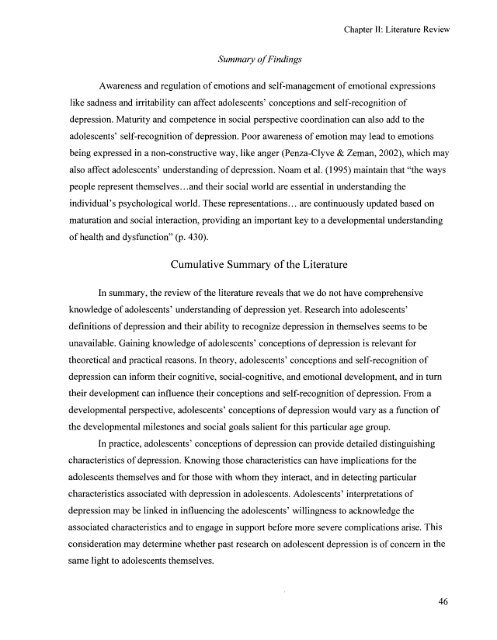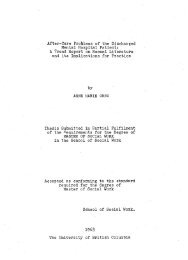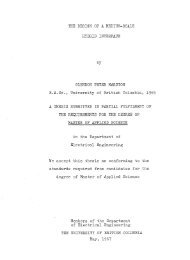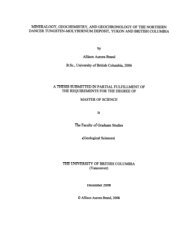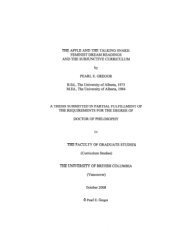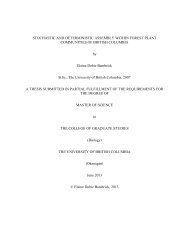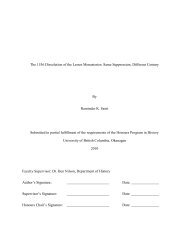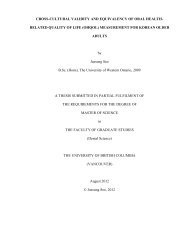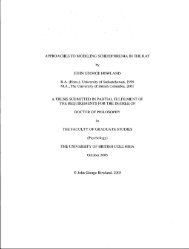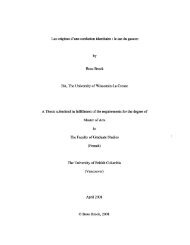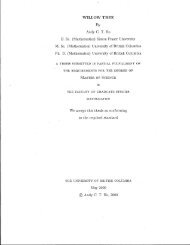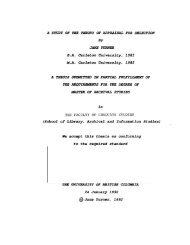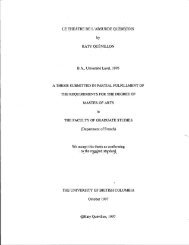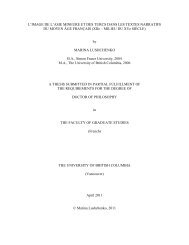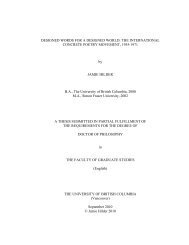how do adolescents define depression? - cIRcle - University of ...
how do adolescents define depression? - cIRcle - University of ...
how do adolescents define depression? - cIRcle - University of ...
Create successful ePaper yourself
Turn your PDF publications into a flip-book with our unique Google optimized e-Paper software.
Summary <strong>of</strong> Findings<br />
Chapter II: Literature Review<br />
Awareness and regulation <strong>of</strong> emotions and self-management <strong>of</strong> emotional expressions<br />
like sadness and irritability can affect a<strong>do</strong>lescents' conceptions and self-recognition <strong>of</strong><br />
<strong>depression</strong>. Maturity and competence in social perspective coordination can also add to the<br />
a<strong>do</strong>lescents' self-recognition <strong>of</strong> <strong>depression</strong>. Poor awareness <strong>of</strong> emotion may lead to emotions<br />
being expressed in a non-constructive way, like anger (Penza-Clyve & Zeman, 2002), which may<br />
also affect a<strong>do</strong>lescents' understanding <strong>of</strong> <strong>depression</strong>. Noam et al. (1995) maintain that "the ways<br />
people represent themselves...and their social world are essential in understanding the<br />
individual's psychological world. These representations... are continuously updated based on<br />
maturation and social interaction, providing an important key to a developmental understanding<br />
<strong>of</strong> health and dysfunction" (p. 430).<br />
Cumulative Summary <strong>of</strong> the Literature<br />
In summary, the review <strong>of</strong> the literature reveals that we <strong>do</strong> not have comprehensive<br />
knowledge <strong>of</strong> a<strong>do</strong>lescents' understanding <strong>of</strong> <strong>depression</strong> yet. Research into a<strong>do</strong>lescents'<br />
definitions <strong>of</strong> <strong>depression</strong> and their ability to recognize <strong>depression</strong> in themselves seems to be<br />
unavailable. Gaining knowledge <strong>of</strong> a<strong>do</strong>lescents' conceptions <strong>of</strong> <strong>depression</strong> is relevant for<br />
theoretical and practical reasons. In theory, a<strong>do</strong>lescents' conceptions and self-recognition <strong>of</strong><br />
<strong>depression</strong> can inform their cognitive, social-cognitive, and emotional development, and in turn<br />
their development can influence their conceptions and self-recognition <strong>of</strong> <strong>depression</strong>. From a<br />
developmental perspective, a<strong>do</strong>lescents' conceptions <strong>of</strong> <strong>depression</strong> would vary as a function <strong>of</strong><br />
the developmental milestones and social goals salient for this particular age group.<br />
In practice, a<strong>do</strong>lescents' conceptions <strong>of</strong> <strong>depression</strong> can provide detailed distinguishing<br />
characteristics <strong>of</strong> <strong>depression</strong>. Knowing those characteristics can have implications for the<br />
a<strong>do</strong>lescents themselves and for those with whom they interact, and in detecting particular<br />
characteristics associated with <strong>depression</strong> in a<strong>do</strong>lescents. A<strong>do</strong>lescents' interpretations <strong>of</strong><br />
<strong>depression</strong> may be linked in influencing the a<strong>do</strong>lescents' willingness to acknowledge the<br />
associated characteristics and to engage in support before more severe complications arise. This<br />
consideration may determine whether past research on a<strong>do</strong>lescent <strong>depression</strong> is <strong>of</strong> concern in the<br />
same light to a<strong>do</strong>lescents themselves.<br />
46


